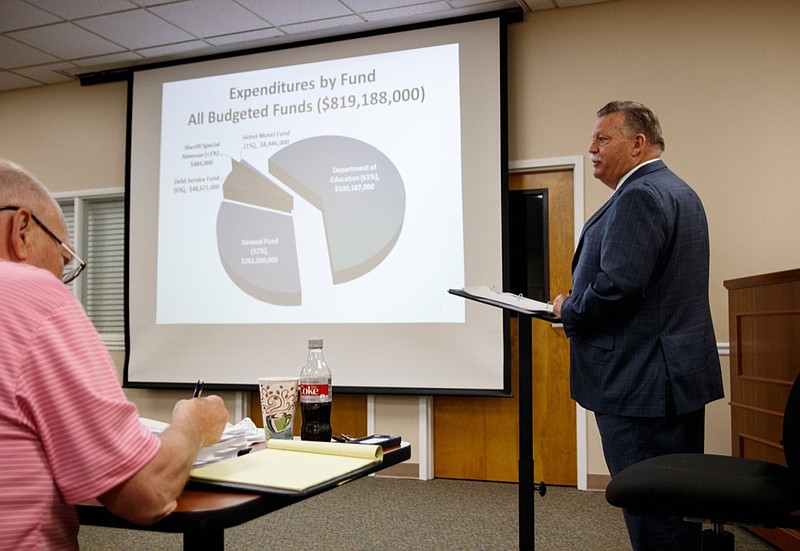Hamilton County Mayor Jim Coppinger is standing up for schools. What remains to be seen is whether the Hamilton County Commission that he leads will do the same.
Coppinger presented his proposed $819 million 2020 budget - an increase of $65 million over this year - to the commission on Tuesday. The proposal includes a nearly $60 million increase to Hamilton County Schools' operational budget - to be partially funded by a 34-cent tax increase for all Hamilton County property owners.
It could have been higher. The school district's $443 million proposed general purpose budget includes a request for an additional $34 million from the county. The remainder of the $60 million increase comes from federal and state funding. And although it had been reported that Coppinger might ask for a 49-cent increase, including another 15 cents for general county government, on Tuesday he told commissioners: "We have totally backed off the other 15 cents that have been talked about. This budget is really about the 34 cents for education."
Saying it's time for the community to make clear where it stands on education, Coppinger clarified his county priorities. He said he wanted to grant Superintendent Bryan Johnson's request for additional operations funding; add paramedics, EMTs, law enforcement officers and school resource officers among other public safety priorities; and maintain the county's triple-A bond rating.
Later, Coppinger told the Times Free Press that Johnson "has proven he can move it [the school system's upward achievement]." Benchmark tests students took at the end of each quarter in the just-ended school year found growth in almost every tested subject. The best example may have been in literacy: In 2018, only 33.7% of the district's third-graders were on track in reading, but according to the final benchmarks taken before students went on spring break, 39.9% of students were on track.
Coppinger also praised Johnson's work to develop a long-term, strategic plan - not just at the top of the system's leadership, but also in classroom culture where bulletin boards and blackboards carry each day's "clear learning target." Another plus was Johnson's push to put access in every county high school to some kind of post-secondary certificate, jobs skill or college-ready program.
"I'm 100% in," Coppinger said. "There's something here for every student [achieving and underachieving], and now we need to take it to another level" by giving our schools more resources.
Aside from annual growth from increased tax revenues due to rising home values and funding from the state, our school district has not received an operational increase since 2005 - 14 years. This budget puts a literacy coach in every elementary school and expands the variety of jobs-ready programs and certificates in our high schools.
It also would pay for a 5% raise for teachers, about 350 additional positions and a laptop for every student. The new and much-needed positions include 15 social workers, 10 special education teachers, 11 art teachers, 42 general classroom teachers, a number of education assistants, 15 truancy officers, 14 school counselors and nine principal/assistant principals.
Coppinger will officially introduce the budget at today's County Commission meeting. A vote is scheduled June 26.
In the meantime, several commissioners plan public meetings for community input.
And the community should weigh in - standing for our children and our future.
Many local industry and Chamber of Commerce leaders already have made the case for better education here, commissioning reports in recent years that show the vocabulary and ready-to-learn gap of kindergarten children, as well as the literacy gap of third-graders all too often follow our children throughout their lives: Only 38% of our high school graduates have been seen as jobs-ready by local employers. Our students' learning, or lack of it, also affects the city and county crime rates, economic growth, wages, tax base and overall financial stability.
In 2017, the county's decision to maintain the millage rate for property taxes - a de facto tax increase - gave us two new schools, two school expansions and much-needed building maintenance. Chattanooga's Mayor Andy Berke and the City Council funded a Baby University to help new parents understand the value of talking with and reading to newborns and toddlers who will gain 80% of their brain's growth in their first few years of life. The city also, despite not having responsibility for funding schools, is paying for an early childhood education program for more than 1,000 pre-K youngsters.
Volkswagen led the way in starting up an industry-based set of training programs for new workers. That work and similar efforts with other employers blossomed into the Future-Ready Institutes - the $11 million district investment in the post-secondary high school programs aimed at graduating students with professional/vocational certificates as well as diplomas.
Those were wonderful first steps, but as Dr. Johnson puts it, "If I invested in my kids based on what they are now, I wouldn't get much. You invest in what you want them to become."
We know he's right. Let's stand with our students.
